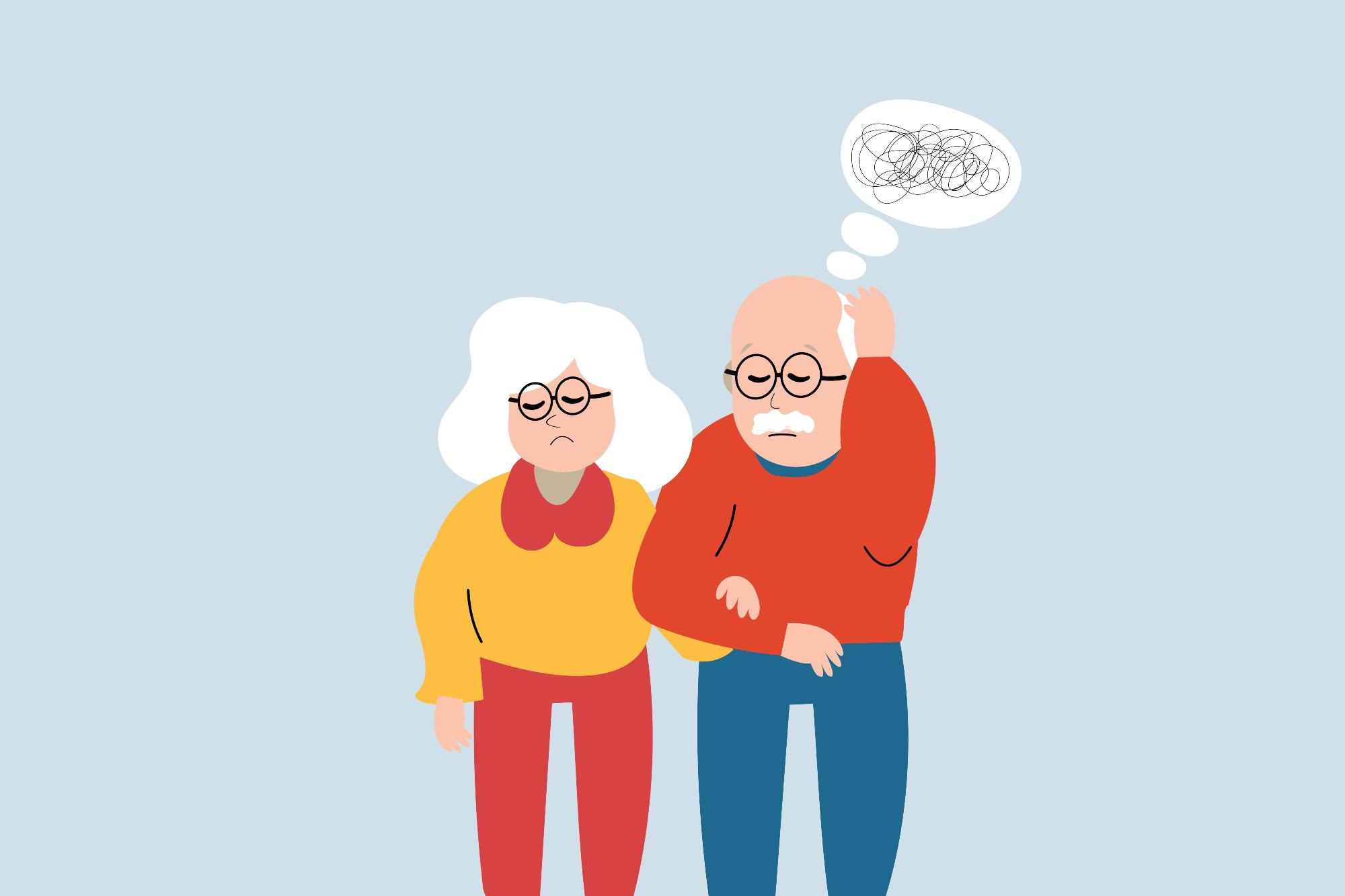Introduction
What is dementia?
Symptoms of Dementia
Ten myths and misconceptions about dementia
References
People worry that they or someone close will get dementia when they get older. But what is dementia, and does it even exist? This article will look at what dementia is before examining ten common misconceptions associated with the disease.

Image Credit: Salim Hanzaz/Shutterstock.com
What is dementia?
"Dementia doesn't actually exist?" according to Professor Craig Ritchie, Chair of the Psychiatry of Aging at the University of Edinburgh, UK. In an address to challenge some common misconceptions about neurological disorders, he informed a Glasgow audience that the diagnostic criteria used for making a dementia diagnosis were fundamentally flawed because they were out of date.
"Dementia is diagnosed on the basis of memory impairment, another cognitive domain being affected, and having an impact on your day-to-day function. There's one thing strikingly missing—the brain. You don't have to have a brain scan; it's purely based on those clinical symptoms."
Professor Ritchie
Nowadays, brain imaging is readily available. Besides this, cerebrospinal fluid and blood testing can be done, alongside cognitive evaluation ––much improved when compared to those offered in the past. Ritchie suggests abandoning the term dementia altogether to talk about 'brain disease.' But the term dementia is still widely in use, and it's a label often found at the heart of much confusion.
So then, what do we mean when we talk about dementia? Dementia is an umbrella term for a range of progressive conditions that affect the brain (Dementia UK, 2021). There are over 200 types of dementia, which stop the neurons (brain cells) from working correctly. The most well-known type is Alzheimer's, while some other types include vascular dementia, frontotemporal dementia (FTD), Lewy body dementia, and mixed dementia.
The term is used to describe a set of common symptoms affecting memory, cognition, and communication that usually worsen over time:
Symptoms of Dementia
Memory problems:
- Increasing forgetfulness
- Difficulty remembering new information
- Misplacing items
- Forgetting names easily
- Getting easily lost, especially in places once familiar
Cognitive function:
- Problems with time and place, e.g., going to the wrong appointment at the wrong time
- Difficulty with shopping and making purchases
- Problems making decisions
- Problems with reasoning
- Loss of interest in things
- Restlessness and fidgeting
Communication problems:
- Repetition in speech
- Difficulties with conversation
- Problems reading and writing
- Lack of interest in socializing
- Withdrawn
- Lacking confidence
- Personality and behavioral change
- Mood swings
- Anxiety and depression
Ten myths and misconceptions about dementia
Myth no. 1: Dementia is inevitable with advancing age
Most people don't develop dementia as they grow older. That said, it is most prevalent in those aged over 65. By 2025 it is estimated that more than one million people in the UK will be diagnosed with dementia.
Alzheimer's disease is the most common form of dementia, and it affects 3% of those aged between 65–74 years of age in the US (Alzheimer's Association, 2019).
Myth no. 2: I have memory loss ––it must be dementia!
Not necessarily so. It can be a normal part of aging or a symptom of other problems such as stress. Besides this, many types of dementia do not feature memory loss as a primary symptom.
Myth no. 3: Dementia is untreatable and progressive
While there is no cure for dementia, it is certainly possible to slow symptoms down with medication and lifestyle changes if caught early enough.
Myth no. 4: Dementia only affects older people
While increasing age is a risk factor and dementia is more prevalent in those aged over 65, a percentage of the population does, in fact, develop early-onset dementia. In those aged 30-60 years, that estimate stands at around 38–260 people in 100,000 — equivalent to 0.038–0.26% (Lambert et al., 2014). Meanwhile, in those aged 55-64, the figures rise to around 420 people in 100,000, or 0.4% (Lambert et al., 2014).

Image Credit: Image Point Fr/Shutterstock.com
Myth no. 5: Dementia is genetic and is therefore passed on between generations
There is no strong genetic link in most of those diagnosed with dementia. But genetics does play a part in developing certain forms of dementia, such as early-onset Alzheimer's disease and Creutzfeldt-Jakob disease.
Myth no. 6: Aluminium can cause dementia
People worry that aluminum cookware might be a cause of dementia. There is no conclusive evidence to suggest that this is the case. This misconception has a basis on experiments first done in the 1960s and since, and no causal links have been established. However, myths still circulate about the danger of drinking from aluminum cans or cooking with aluminum pans.
Myth no. 7: Smoking can cause dementia
Smoking alone doesn't cause dementia, but it is certainly one of the risk factors for developing the disease.
Myth no. 8: People with dementia are "not with it"
While it's easy to assume those living with dementia don't know what is going on around them, dementia is a very individual experience. The disease can appear differently in different people suffering from the disease. In its early stages, dementia can be relatively mild. At this stage, people can look after themselves and need only very minimal assistance, if any at all.
Myth no. 9: A dementia diagnosis spells the end of a meaningful existence
As already discussed above (see myth no. 8), in its early stages, the disease can be very mild and this non-intrusive. A diagnosis of dementia does not entail an automatic and immediate halt to aspects of life such as going for a walk or driving. Adjustments will need to be made as the disease progresses, but that does not spell the end of a meaningful life.
Myth no. 10: Dementia is a preventable disease
This is regrettably untrue. There are modifiable risk factors for dementia, so reducing the chances of developing the disease is possible. According to a 2020 report in the Lancet, 12 identifiable risk factors increase the likelihood of developing dementia: lack of education; smoking; obesity; hypertension; depression; sedentary lifestyle; alcohol; social isolation; diabetes; traumatic brain injury, and air pollution.
References:
- Alzheimer's Association (2019) 2019 Alzheimer's Disease Facts and Figures. Online:
- https://www.alz.org/media/documents/alzheimers-facts-and-figures-2019-r.pdf.
- Alzheimer Society of Canada (2021) Myths and realities of dementia. Online:
- https://alzheimer.ca/en/about-dementia/stigma-against-dementia/myths-realities-dementia#Read_this_information_in_a_downloadable_PDF.
- Dementia Australia (2020) Confronting the myths. Online:
- https://www.dementia.org.au/information/for-health-professionals/dementia-the-essentials/confronting-the-myths.
- Dementia UK (2021) What is dementia? Online:
- https://www.dementiauk.org/about-dementia/dementia-information/what-is-dementia/.
- Lambert, M. A. (2014) Estimating the burden of early onset dementia; systematic review of disease prevalence. European Journal of Neurology.
- Doi: 10.1111/ene.12325Cit.
- Ranscombe, P. (2019) Dispelling myths and legends about dementia. The Lancet.
- Doi: 10.1016/S1474-4422(19)30072-9.
Further Reading
Last Updated: Jun 28, 2022